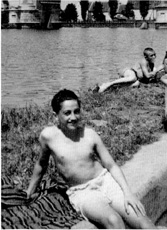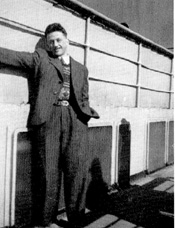
Day after day, news continued to trickle in that the Nazis were being driven back. The war had turned against Hitler. The Nazis knew they were about to lose the war, and they needed to hide the evidence of their crimes. John watched one day in amazement as the gas chambers of Auschwitz were torn down and destroyed.
And then new rumors started to circulate. The Nazis were moving their prisoners to camps deeper within Poland and Germany, trying desperately to evade the Allies, who were pressing closer.
In January 1945, all the able-bodied prisoners of Auschwitz were assembled in the open fields, and told that they would be leaving the camp. Along with thousands of other inmates, John was marched out of the concentration camp, and forced to march to a railway station fifty kilometers (thirty miles) away. There they boarded open coal-trains that carried them to other concentration camps.
John spent two months in a camp called Flossenburg. From there, he and the other prisoners were ordered to set out again, marching to an unknown destination in the bitter cold, with little to eat, drink, or keep them warm. They slept in open fields and barns, huddled together for warmth. The ordeal took one hundred days, but John was hardly aware of the passage of time. The hours, days, and weeks went by in a blur. He walked automatically, placing one bleeding foot in front of the other, forcing a mechanical rhythm from his body that would keep him going. At night he closed his eyes, numb with pain, and then dragged his battered body into the cold for another day.
Many people fell ill around him. Hundreds of prisoners died each day, and their bodies were abandoned by the side of the road. John did not know how much longer he could survive. He had not eaten in days, and he had little strength. His time was running out.
One day in April 1945, just when he thought that he too might die, John looked up and saw American tanks approaching. Was this a dream? He rubbed his eyes in disbelief. With his last ounce of energy, he ran toward one of the tanks. A friendly American soldier lifted him up and handed him a chocolate bar.
The war was over.
John was alive and safe.
As soon as he was strong enough, John returned to Budejovice. He was now fifteen years old, and he was all alone. For three years he stayed in Budejovice, regaining his health. He returned to school, went to the movies, and attended concerts – all the things that had been denied to him during those long years of persecution and war.


Left: John was fifteen years old when the war ended and he returned to Budejovice. This photo was taken three months after his liberation. Right: A photo of John at the age of eighteen, taken on board the boat en route to Canada.
He was also reunited with Zdenek Svec, the Christian boy who had steadfastly remained his friend. As she had promised, Zdenek’s mother had kept the Freund family’s belongings – his mother’s fur coat, paintings, and rugs – safe during their absence. “Take them,” she urged. “They belong to you.” But to John, these things had little meaning. What good were fur coats and art? What he really wanted was his family. In the end, Zdenek’s mother gave him some money for the valuables, so he could begin to make plans for his future. In March 1948, John left Czechoslovakia, and went to a country with a strange sounding name – Canada.
Before leaving Budejovice, though, he returned for a visit to the swimming hole. He stood on that familiar piece of land, and he closed his eyes and thought of those who were gone forever. First, he thought of his friend Beda. He could almost see him with his nose buried in a book, or contemplating his next chess move. Then he remembered Tulina, with her beautiful curls and her bright, warm smile. He thought of Rabbi Ferda, who had tried so hard to provide spiritual leadership for his community of families. And he thought of Joseph Frisch, who had been a good and dedicated teacher.
It was quiet by the river, but in his mind John could hear the sounds of his friends laughing, singing, playing sports, and talking about the newspaper Klepy. He could almost see Ruda Stadler seated at his typewriter in the shed, surrounded by mounds of paper, or pacing with the other editors, discussing what to include in the next issue.
The Jewish children of Budejovice had been young and healthy, with strong spirits and boundless energy. They had had a deep love for their homeland, and a strong faith in their future. They had dreamed of growing up to be doctors, writers, musicians, or teachers. It had been unthinkable to them that they might die young instead. And yet not one of them was here today.
John remembered the blood contract he had signed with his friends, promising each other that they would meet one day in the future. That reunion would never be possible. He was the only one who had returned. He stood in the center of their former playground and spoke their names aloud in a prayer to their memory. Then he turned his back and left the swimming hole for the last time.